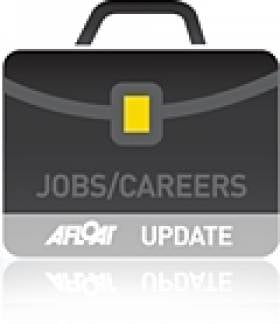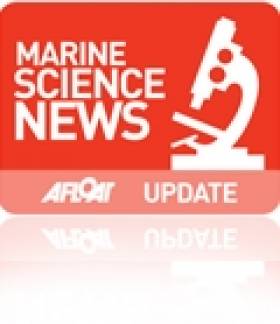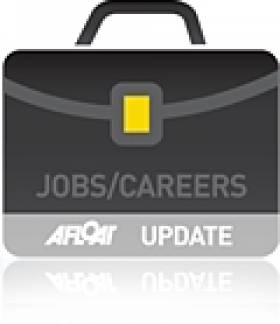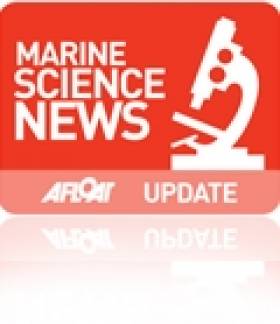Displaying items by tag: Marine Institute
Marine Researchers Brave Elements For Workshop On Cross-Cutting Opportunities In EU Funding
#MarineScience - More than 60 marine researchers from third level institutes, Government agencies and SMEs braved the elements to get to the Marine Institute in Oranmore on Thursday 7 January for information and advice on the many EU funding opportunities for marine research.
The workshop – titled Cross Cutting Marine Opportunities in EU Funding, as previously reported on Afloat.ie – was organised by the Marine Institute’s Research Office.
Welcoming participants, John Evans, director of policy, innovation and research at the Marine Institute, highlighted the success of Ireland’s marine researchers to date in winning competitive EU funding.
“Irish researchers have won 3.6% of the available funding for Blue Growth topics under the most recent round of results announced by the European Commission for Horizon 2020 Societal Challenge 2, and this rises to 4.6% when marine related topics relating to sustainable food security are considered," he said.
"This is becoming a consistent pattern, with Irish marine researchers winning more European competitive funding than would be expected from a country our size.”
Evans also spoke of the need for a focus on national research collaboration to maintain and improve this competitive position, and the importance of relevant national strategies as tools for researchers preparing funding proposals, specifically Harnessing Our Ocean Wealth – An Integrated Marine Plan for Ireland, and the National Strategy for Science, Technology and Innovation 2015-2020.
The Marine Institute's Dr Fiona Grant, national contact point for marine aspects of Horizon 2020 Societal Challenge 2, gave an overview of the priority topics for Blue Growth with a total of €148.5m available funding with contributions from the Climate, Energy and Transport parts of the Horizon 2020 programme.
'Linking healthy oceans and seas with healthy people’ was one of the key topics covered. Dr Grant mentioned the concept of the ocean as a "blue gym", citing a recent European Marine Board position paper that shows the significant impact of the oceans on human health and wellbeing.
Dr Sean McCarthy of Hyperion Ltd gave very practical advice on how to write a competitive Horizon 2020 proposal, with lots of insights for both new and experienced funding applicants. He told scientists to focus on the potential impact of the research proposal.
“Begin your proposal with impact – the impact is the big issue. Then write the science around the impact,” he said.
Other advice from Dr McCarthy included contacting the national contact point to ensure a better success rate.
“When writing your proposal it’s important to understand how the research priorities have been selected and the national contact point can give you insight into this,” he added.
Gerry Finn, director of the Northern and Western Regional Assembly and national contact point for the INTERREG Atlantic Area, gave an overview of the INTERREG Atlantic Area Programme 2014-2020 and success stories from the 2007-2013 ERDF programmes., under which €12.9m in ERDF funding was approved to 56 Irish projects.
Also speaking on the day was Michael O’Brien, EU Programme liaison officer, who gave an overview of eligibility criteria and guidelines on what makes a successful proposal under this financing mechanism. Four priority areas have been identified which include:
- Stimulating innovation and competitiveness.
- Fostering resource efficiency.
- Strengthening the territory’s resilience to risks of natural, climate and human origin.
- Enhancing biodiversity and the natural and cultural assets.
Over €140m will be available under the call from 2014-2020 which is expected to be launched in the middle of 2016.
O’Brien advised that the technical parameters "are not formally agreed yet by the member states and there may be further changes over the coming weeks. The working group for the programme meets again shortly to advance the progress on the programme manual and application process.”
#MarineNotice - The latest Marine Notice from the Department of Transport, Tourism and Sport (DTTAS) advises that a Marine Institute monkfish and megrim trawl survey will be carried out off the west and southwest coasts of Ireland between 4 and 24 January 2016.
The survey consists of a maximum of 70 fishing stations of one-hour duration each in ICES (International Council for Exploration of the Sea) areas VIIb, c,g, h,j.
Approximate positions for these hauls are given in Figure 1 and Table 1 included in Marine Notice No 52 of 2015, a PDF of which is available to read or download HERE.
Bottom trawling will take place within a 3-nautical0mile radius of these locations.
The survey will be conducted by the RV Celtic Explorer (Callsign: EIGB). The vessel will display all appropriate lights and signal during the survey and will also be listening on VHF Channel 16.
She will be towing a commercial monkfish demersal trawl during fishing operations. The Marine Institute would request commercial fishermen to keep a 3-nautical-mile area around the tow points clear of all commercial gear during the period.
While there is no statutory provision for the loss of fishing gear, the Marine Institute will make every effort to avoid gear adequately marked according to legislation (Articles 9-17 of EU Regulation 404-2011) that may have drifted into the notified areas.
In the event that a fisherman has static gear or other obstructions within 3 nautical miles of the points listed above, it is the responsibility of the owner to notify the survey managers or vessel directly via the following contacts:
- Aodhan Fitzgerald, Marine Institute: 087 248 8765
- Hans Gerritsen: [email protected]
Cross-Cutting Marine Opportunities in EU Funding For Research & Business
#MarineScience - The Marine Institute is hosting a one-day event for marine researchers and SMEs looking at cross-cutting opportunities in Horizon 2020 and the Interreg Atlantic Area Programme.
The first part of the day, on Thursday 7 January 2016 from 9.30am to 5.30pm, comprises a half-day course delivered by Dr Seán McCarthy on how to write a competitive proposal for Horizon 2020.
The aim of this course is to train researchers, research managers and research support services in writing professional and competitive proposals for the 'blue growth' programme.
It will describe the relevance of Horizon 2020 to EU policies, and identify common problems in proposal writing and the success criteria for proposals.
The course provides tips on how to collect information, how to select strategic partners and how to avoid duplication in proposal writing. The final section describes a strategy for proposal writing.
Later, Michael O'Brien of the North & Western Regional Assembly will hold an information session on the Interreg Atlantic programme.
This programme area is rich in maritime heritage and marine resources and boasts a strong Atlantic cultural identity. The area is also challenged by ongoing deficits in innovation and SME competitiveness capacity as well as environmental threats including climate change and threats to the biodiversity of the Atlantic area.
The agreed Programme Priorities respond to these challenges and will furthermore exploit opportunities in niche areas such as green growth, renewable energies and eco-Innovation.
The eligible priorities for the 2014-2020 programme period are:
- Stimulating innovation and competitiveness.
- Fostering resource efficiency.
- Strengthening the territory's resilience to risks of natural, climate and human origin.
- Enhancing biodiversity and the natural and cultural assets.
In the afternoon there will be opportunities for one-on-one advisory meetings with national contact points. Meeting rooms will also be available for breakout sessions if required.
For more information on the day and how to attend, visit the Marine Institute website HERE.
Transition Year Students Visit Marine Institute
#MarineScience - The Marine Institute welcomed more than 300 Transition Year students during Science Week as part of the Galway Science & Technology Festival and the Sea for Society FP7 project.
The pupils met marine scientists and staff to learn about the wide variety of work they do, and how the science of the sea impacts on our daily lives, for example the food we eat, the air we breathe, and the water we drink.
Dr Paul Connolly, director of fisheries ecosystems and advisory services, gave an overview of the broad work programmes of the Marine Institute and the many benefits we derive from the ocean.
Students also saw a short video on the recently commissioned Galway Bay Ocean Observatory, which streams live data and video from the seabed off the coast of Spiddal.
Marine Institute chief executive Dr Peter Heffernan said: "We're delighted see so many students here and hope they'll be inspired by the people they meet and by work that we're doing here to understand our unique ocean resource.
"I'm sure we'll see some of them again as ocean explorers, marine biologists, oceanographers, or geographers mapping the seabed, or as engineers, developing novel marine renewable energy devices. I believe they will have many opportunities, particularly with a national and EU focus on the potential of the 'blue economy' with the Government plan Harnessing Our Ocean Wealth and the European Commission's Atlantic Strategy."
Vera Quinlan, of INFOMAR, the national seabed mapping programme by the Marine Institute and Geological Survey of Ireland, demonstrated her work mapping the seabed using the latest technology – and discovering mountains in the Atlantic ocean higher than Carrauntoohil.
Quinlan has developed Ireland's first augmented reality (AR) sandbox based on a concept first developed as part of a National Science Foundation (NSF) funded project led by the visualisation collaboration KeckCAVES at the University of California.
The visiting Transition Years were the first students to try out the AR sandbox, a scientific educational tool to help users to explore the importance of topography, contouring, geology and seabed mapping.
"We constructed the AR sandbox as part of the education and outreach program for INFOMAR and we believe that it will help share the story, the science, and the adventure that is INFOMAR," said Quinlan.
Fisheries scientists explained how they assess fish stocks so that we know the sustainable limits for fishing. Students learned about ocean acidification and had an opportunity to carry out experiments on pH levels.
They also learned about the science behind seafood safety, and met the scientists that make sure the Irish shellfish we eat are free from naturally occurring toxins.
AquaTT, lead Irish partner in the Sea for Society FP7 project, helped to promote the project and the Blue Society concept, highlighting that the ocean is home to millions of undiscovered species; provides us with food and transport as well as essential biological, mineral and energy resources; regulates our climate; and is at the heart of the water cycle, producing half of the oxygen we breathe.
In addition, students got to test-drive a mini submarine (ROV) with the help of the Research Vessel Operations team, and were introduced to a wide variety of marine career opportunities as well as maritime training opportunities by the Irish Maritime Development Office (IMDO).
The Marine Institute will be at the Galway Science & Technology Festival Exhibition this Sunday 22 November alongside Galway Atlantaquaria with the Explorers Education programme for primary schools.
Marine Institute Recruitment Drive Closing Soon
#Jobs - Applications close this coming Friday 13 November for a number of scientific management and research positions with the Marine Institute.
Those interested in various Scientific & Technical Officer roles – in Project Support, Ocean Modelling, Observing Systems (JERICO Next), Habitat Mapping and the 'Value Added' strand of the INFOMAR programme – have until 4pm this Friday to submit their applications.
Also closing on the same day are the positions of Hydrographic Data Processor (INFOMAR), Team Leader on infrastructure projects such as EMSODEV and FIXO3, and a vacancy for a post-doctorate researcher on creating knowledge for precision fisheries management.
Prospective applicants have a little longer for the vacancy in Administrative, Research & Project Support in the Stagaire programme (closing Wednesday 18 November) and the last available spots in the two-year full-time Masters of Commerce Scholarship in Strategic Marketing (closing Monday 30 November).
#BlueFutures - The Marine Institute's chief executive Dr Peter Heffernan is representing Ireland at a number of international events in Europe, USA and Canada where he has promoted the importance of the oceans in the planetary life support system.
“Ninety-seven per cent of the water on our planet resides in the ocean and everything we eat depends on it,” he told an EU conference at EXPO Milano titled ‘Strengthening global food and nutrition security through research and innovation’.
The EU’s objective at this conference was to provide an opportunity for a global debate on how science and innovation can help the EU play its role in ensuring safe, nutritious, sufficient and sustainable food across the world.
Dr Heffernan emphasised the critical role the ocean plays in the production of food. "The ocean affects every human life as it drives the water cycle supplying us with freshwater (via rain), moderates the weather and continuously influences the climate which in turn affects the production of our food on land,” he said.
“With our reliance on the ocean, it is important to include research efforts in better understanding the oceans vulnerabilities particularly those relating to adapting to climate and environmental changes.”
This message was further highlighted by Dr Heffernan when he also addressed the Ocean Innovation Canada 2015 conference in St John's, Newfoundland this week (26-29 October), where the event focused on the importance of ocean mapping for oil and gas, aquaculture, fisheries and marine industry.
With ongoing collaborations between the Marine Institute and the Memorial University Centre for Fisheries Ecosystems Research (CFER) in St John's, Ireland carried out the first transatlantic seabed mapping survey under the Atlantic Ocean Research Alliance on the RV Celtic Explorer earlier this year.
“This was directly facilitated by the 2015 charter by CFER and we are very excited about opportunities to expand the scale and impact of the transect mapping with AORA partners in 2016,” said Dr Heffernan.
Meanwhile, at Transatlantic Science Week next week (4-6 November) in Boston, Massachusetts, Dr Heffernan will further emphasise the importance of undertaking research that will provide the basis for our understanding of the ocean and how it affects our daily lives.
This year’s theme – Blue Futures – will focus on the changes our oceans and their biological resources are undergoing as well as the effects and consequences of these processes.
A key focus will be on stewardship of the sea, oceans and human health and productive seas and coasts, which supports the directive of the Galway Statement on Atlantic Ocean Cooperation, the research alliance between the EU, Canada and the USA.
Deadlines Approaching For Marine Institute Roles
#Jobs - Deadlines to apply for a number of jobs with the Marine Institute are coming up over the next two weeks.
Those interested in the role of Oceanographic Services Manager have until 5pm today (Wednesday 1 July) to submit their applications.
Tomorrow (Thursday 2 July) at 5pm is the closing date for two Team Leader positions, in Data Management and Software Development.
Graduates interested in the role of Economic Researcher should submit their CVs and cover letters by 4pm on Friday 3 July, which is also the closing date for the Cullen Fellowship for PhD students in ocean observation. Applicants for the Communications Stagiaire position have until 5pm on the same date.
Meanwhile, marine science graduates interested in the PhD opportunity in Ocean Colour and Dynamics in the Eastern Atlantic from Satellite Observations (OCEANS) have until 5pm on Wednesday 15 July to submit their applications ahead of interviews commencing the following week.
For the latest vacancies see the Marine Institute website HERE.
Students Join Marine Institute For Summer Science Placements
#MarineScience - The annual Marine Institute bursary programme gets underway this month with 23 third-level students from academic institutions in Ireland and the UK joining the institute for eight weeks.
Every year up to 150 of third-level students across Ireland apply for the Marine Institute's highly sought-after bursary programme, which is well recognised in the industry as its purpose is to promote future employment opportunities for undergraduates and postgraduates.
"The work experience programme enables students from a wide variety of disciplines to further their knowledge and research in their particular area of interest and it offers the students to expand their professional networks within Ireland and internationally," explained Helen McCormick, senior laboratory analyst at the Marine Institute and co-ordinator of the bursary programme for 2015.
The students will work in a variety of areas including fish and shellfish assessments and surveys, sampling salmon and commercial fisheries in ports, maritime economics, oceanographic equipment modifications and communications.
The placements will provide students with practical and hands-on experience at different locations around Ireland, including the offices and laboratories at the Marine Institute - Galway, Harcourt Street in Dublin and the Burrishoole Catchment at Newport, Co Mayo. Some students will also be located at fisheries ports in counties Cork and Waterford.
The summer bursary programme has been ongoing since the 1960s in the marine science sector and continues to offer a promising gateway into the expanding areas of marine science and research in Ireland.
Dr Peter Heffernan, CEO of the Marine Institute congratulated all successful bursars on this year's programme, saying: "The institute is delighted to support this excellent learning opportunity for Irish students."
Marine Institute Seek Appointments to Board
#Jobs&Careers- The Marine Institute, the State agency responsible for marine research, technology development and innovation in Ireland, is currently seeking appointments to its Board.
The Marine Institute was set up under the Marine Institute Act 1991: "to undertake, to coordinate, to promote and to assist in marine research and development and to provide such services related to research and development, that in the opinion of the Institute, will promote economic development and create employment and protect the marine environment."
The Minister for Agriculture, Food and Marine invites applications from qualified candidates for five vacancies on the board of the Marine Institute. Candidates must have demonstrable experience relevant to the work of the Institute in one or more of the following areas:
Shipping
Law
Seafood Industry Development
Scientific Research
Enterprise Development / Innovation
Candidates interested in the shipping and law opportunities should be able to demonstrate the following capabilities:
Shipping: Operational experience, at management level. in national and/or international shipping is required.
Experience in ship financing or leasing is desirable.
Law: Experience and/or knowledge of Public Administrative Law, European Environmental Law, Marine Law, or Corporate Law is required.
The closing date for submission of expressions of interest is the 24th of June 2015
For further information regarding the board appointments, consult the Stateboards.ie website HERE
#MarineScience - Following its issue by the Central Bank last year, the limited edition Silver Proof coin commemorating John Philip Holland, the Irish-born inventor of the modern submarine, was presented to Taoiseach Enda Kenny and Marine Minister Simon Coveney during their recent visit to the Marine Institute.
Highlighting the significance of Ireland's strong maritime history, Marine Institute CEO Dr Heffernan explained how this country "is at the cutting edge of international marine research driving ocean discovery and exploration.
"Supporting the Irish-led first transatlantic mapping survey from Newfoundland to Galway this coming month [June 2015], the Marine Institute's national research vessel RV Celtic Explorer will be using its extensive multibeam sonar equipment mapping parts of the Atlantic seabed."
Dr Heffrnan added: "The oceans are the life support system of our planet – producing half the oxygen we breathe; providing us with a wealth of resources including food, minerals and energy; as well as affecting our moderate climate in Ireland. It is essential that we continue to improve our understanding of how the ocean impacts our live."
By 2020, in partnership with the Atlantic Ocean Research Alliance between the EU, Canada and USA which was established by the signing of the Galway Statement in 2013, Dr Heffernan says "we aim to be able to predict the major risks and changes in the dynamics of the Atlantic Ocean.
"Just as John Philip Holland set out to discover the depths of the sea over one hundred years ago, we continue this quest of discovery and innovation through advanced technology."































































